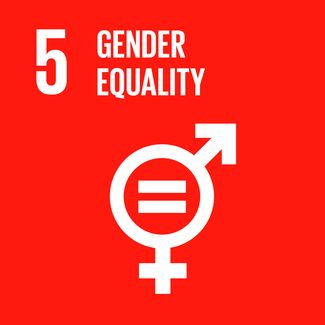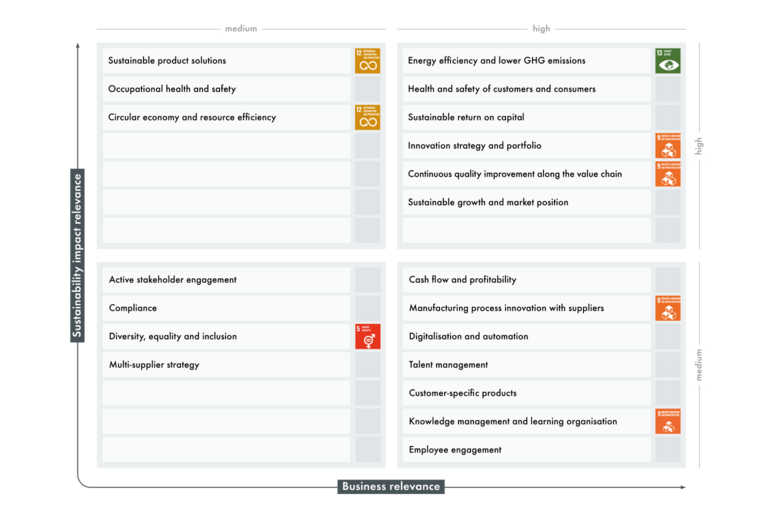What is important?
Which issues matter most to our stakeholders? And which topics are most relevant to ensuring our business success in the near, medium and long terms? Based on these questions, and guided by the IIRC's "six capitals", we have defined the material topics shown in this matrix:
The matrix serves as a basis for the strategic orientation and structuring of our reporting.
Contribution to the United Nations Sustainable Development Goals (SDGs)
We apply the 17 Sustainable Development Goals defined by the United Nations (UN) as a reference system that enables us to integrate the environmental and social impacts of our own business activities into the context of global sustainable development. Four of the SDGs are particularly relevant to us, and we see them as offering the greatest leverage for us to make a significant contribution:
Our contribution to Industries, Innovation and Infrastructure (SDG 9)
Our strategic orientation is based on the core goals of building resilient infrastructure and promoting sustainable industrialisation in Europe's least developed countries. Our investment programme will bring processes, plants and technologies into line with the latest state-of-the-art so as to support sustainable industrialisation. Investment projects in the regions will foster a network of small companies around each plant. All the plants in the Vetropack Group – as well as their partners along the value chain and in the vicinity of our sites – will benefit from the Group's innovations and investments in various areas.
Aspect where we can exert particular influence:
9.2: "Promote inclusive and sustainable industrialisation and, by 2030, significantly raise the industry’s share of employment and gross domestic product, in line with national circumstances, and double its share in least developed countries."
Material topics:
- Innovation strategy and portfolio
- Learning organisation
Areas for action and objectives:
- Invest in less developed European countries (such as the Republic of Moldova)
- Integrate local suppliers into the supply chain, especially in countries with low levels of development
- Create an Innovation Centre as the hub for innovation and research
- Collaborate with research centres and industry players to drive innovations ahead on a joint basis
- Build up a technical Group organisation reflecting the Group's strategic orientation, to ensure optimal production performance and product quality in line with the predefined standards
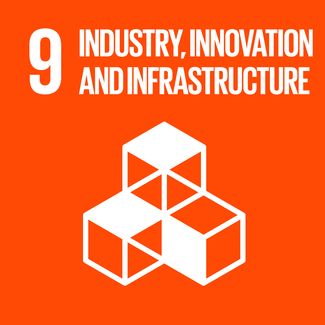
Our measures to protect the climate (SDG 13)
As an industrial enterprise that operates internationally with a significant requirement for energy and resources, Vetropack has an ecological footprint. We focus our ecological engagement on climate protection.
Aspect where we can exert particular influence:
- 13.3: "Improve education, awareness-raising and human and institutional capacity on climate change mitigation, adaptation, impact reduction and early warning."
Material topics:
- Energy efficiency and renewable energies
- Minimise CO2 emissions, waste and water consumption
Areas for action and objectives:
- 30 percent reduction in CO2 emissions by 2030 (2019 basis)
- Switchover to "green power" by 2025
- Substantial medium-term investments to help reduce CO2
- Increased modal shift of external transport from road to rail
- Carbon-neutral internal transport
- Reduce water footprint
- Reduce waste
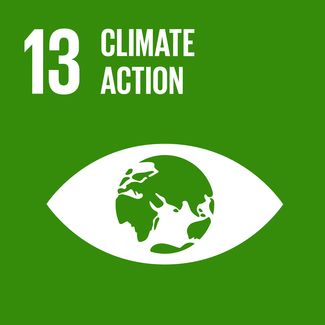
Our contribution to responsible consumption and production (SDG 12)
The world's population currently consumes more resources than the ecosystems can provide. In addition to consumption of resources, the waste generated by consumption presents another major global problem. Glass has numerous properties that can contribute to more sustainable consumption: less consumption of resources, less wastage of food, and less waste.
Aspects where we can exert particular influence:
- 12.2: "By 2030, achieve the sustainable management and efficient use of natural resources."
- 12.5: "By 2030, substantially reduce waste generation through prevention, reduction, recycling and reuse."
Material topics
- Sustainable products
- Recycling of used glass
Areas for action and objectives
- Improve recycling in the value chain
- Increase the share of cullet from 53 percent to 70 percent
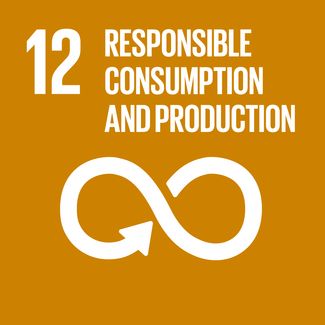
Our contribution to gender equality (SDG 5)
Eliminating gender-specific differences is mandatory for a company that is committed to a comprehensively sustainable business policy. What is more: gender equality has been shown to have positive effects on economic success, productivity, competitiveness and innovation intensity. Women have traditionally been in the minority in the glass industry, at all hierarchical levels and in all job profiles. This is why we believe there is so much potential here.
Aspect where we can exert particular influence:
- 5.5: "Ensure women’s full and effective participation and equal opportunities for leadership at all levels of decision-making in political, economic and public life."
Material topics:
- Attractive employer
Areas for action and objectives:
- Identify and eliminate gender-specific pay disparities
- Encourage balanced inclusion of women and men in decision-making processes
- At least 20 percent more women in decision-making positions by 2030
- Increase the quota of women in our talent pool by 40 percent by 2030
- Create a work environment that fosters a culture of diversity at every level
